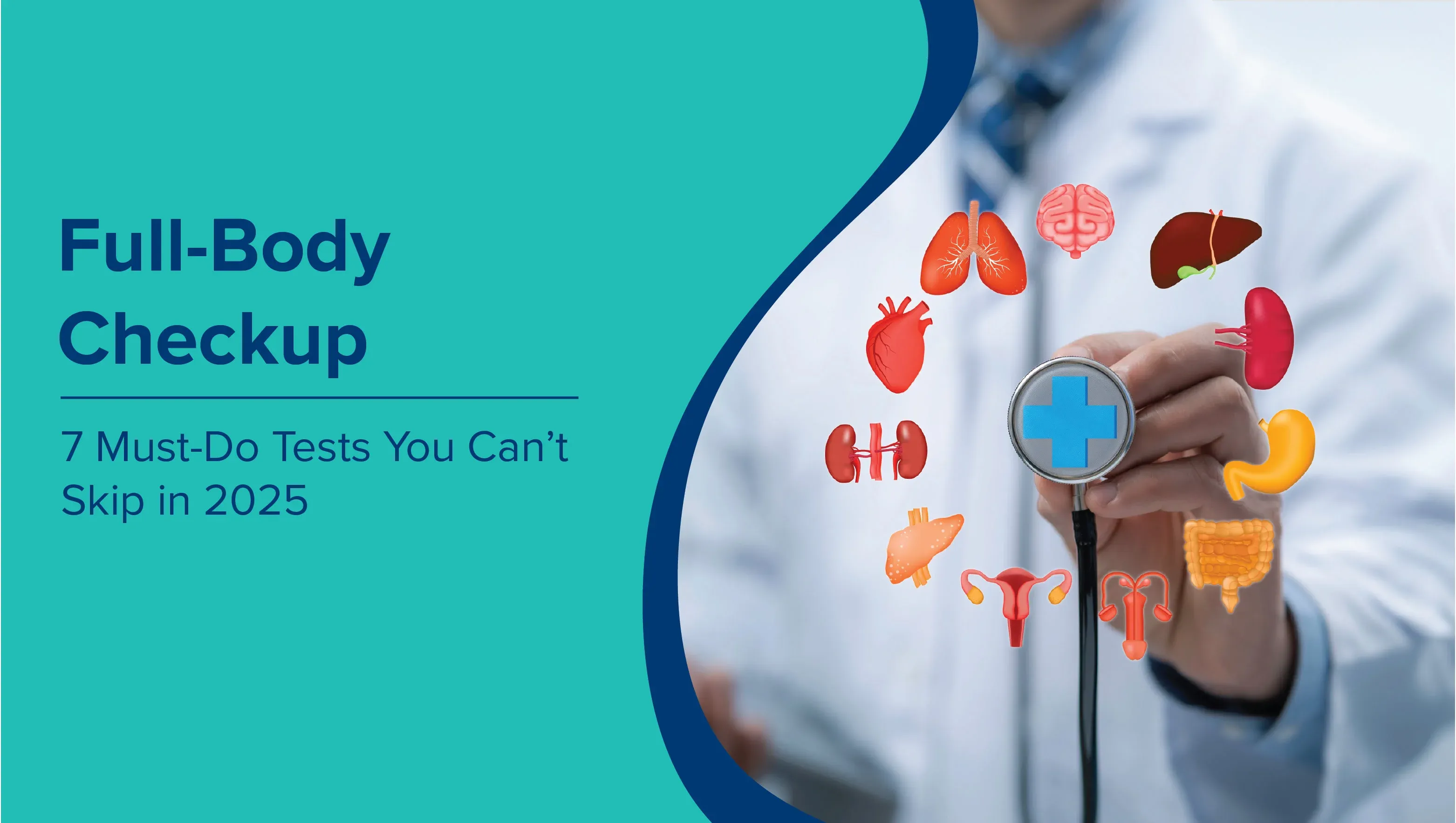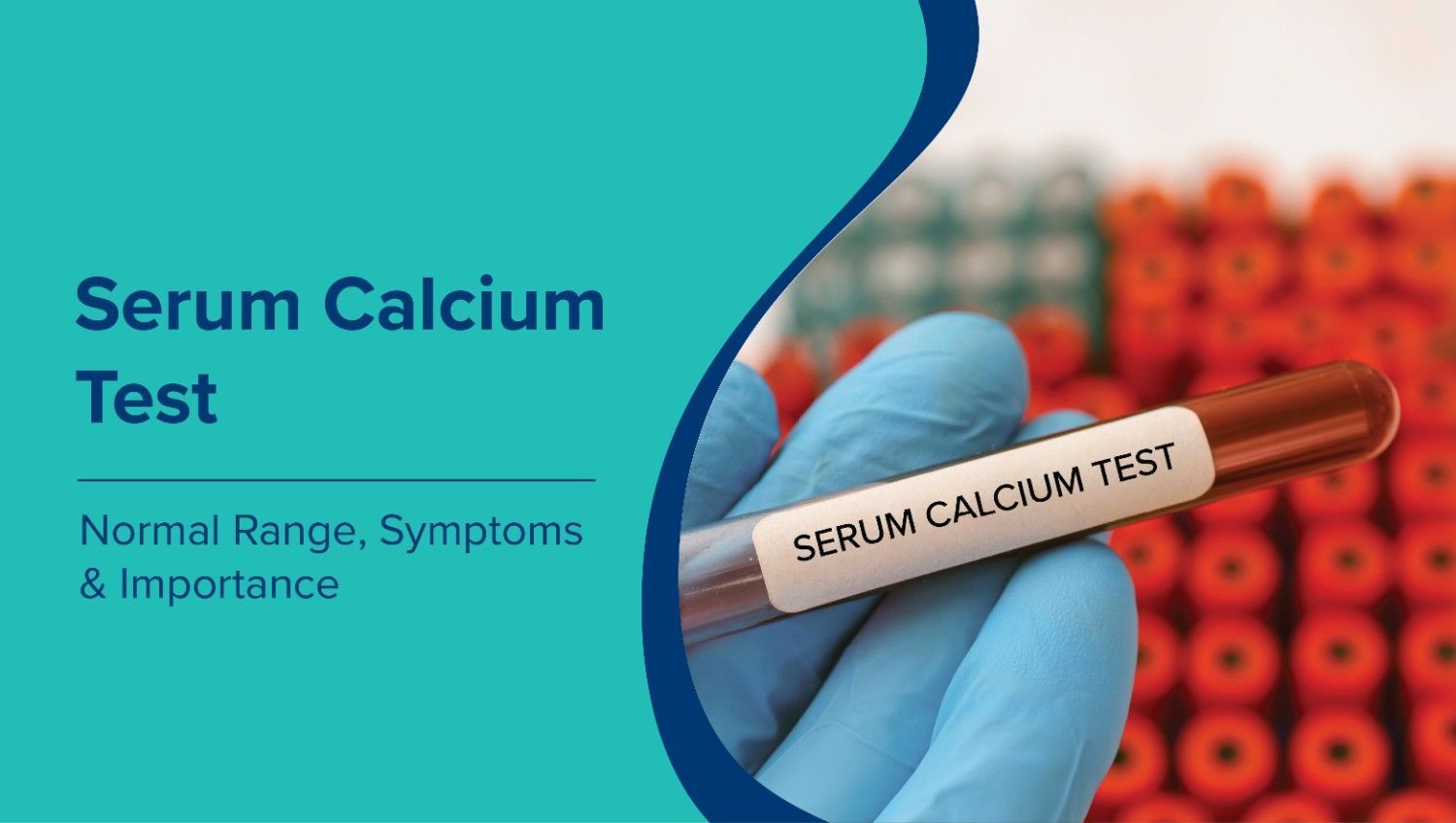Periodic check up is important towards maintenance of overall health and early detection of illness sometimes before the onset of symptoms of the disease. A complete physical Checkup gives a detailed idea of the status of one's health by assessing vital organs and body functions.
With the advent of the year 2025, with the rise in lifestyle-related conditions and chronic diseases, the need for a proper body examination is intensified.
The seven tests that must not be missed during a full health Checkup, explaining their significance, the parameters being measured, and estimated costs, especially for those living in Delhi NCR and similar urban areas.
What is a Full Body Checkup?
A complete body Checkup (also referred to as whole body or complete body Checkup) is a series of medical tests done periodically to evaluate the overall well-being. It identifies the telltale signs of chronic diseases like diabetes, heart disease, liver or kidney disease, thyroid disease, and nutritional deficiency. A routine Checkup involves blood, urine, and occasionally imaging tests with the goal of screening several key health parameters.
Why Should You Opt for a Full Body Checkup?
- Early detection of severe health issues
- Prevention through prompt action
- Monitoring common health conditions and response to treatment.
- Increasing awareness of your own metabolic and nutritional well-being.
- Establish a baseline health standard against which future measurement will be done.
What Are the Benefits of Getting the Test Done?
The benefits of a body Checkup are numerous. First, it provides a complete picture of one's overall health by tracking different organs and body functions. Early detection aids in early treatment and lifestyle changes, thus preventing complications. Second, it helps in proper control of already existing health issues and tracking their progress. Third, regular Checkups allow individuals to make educated decisions about diet, physical activity, and mental well-being. In short, a body Checkup ensures more serenity by ensuring the enhancement of preventive medical practices.
What Tests Are Included in the Health Checkup Package?
A standard workup package is usually a collection of over 80 diagnostic tests that screen blood, urine, and sometimes imaging studies. These may include:
1. Complete Blood Count (CBC)
What it measures:
The CBC is an analysis of the cellular components of blood, including red blood cells (RBCs), white blood cells (WBCs), haemoglobin, haematocrit, and platelets. It helps evaluate your immunological performance, circulating levels of Oxygen and possibility of clotting.
Importance:
CBC will diagnose anemia, infection, leukaemia or lymphoma, inflammation, or bleeding diseases. Hemoglobin and hematocrit measures indicate efficiency of oxygen carriage, critical in diagnosing the cause of dizziness or fatigue.
Average cost:
CBC test ranges around Rs 200-Rs 600. It is mostly included in full body Checkup packages.
2. Blood Glucose Tests (Fasting Blood Glucose and Hemoglobin A1c)
What it measures:
- Fasting Blood Sugar (FBS) determines present blood glucose after overnight fasting.
- HbA1c provides an average of blood glucose over the last 2-3 months.
Importance:
As India is the world's diabetes capital, monitoring blood sugar is essential. Elevated blood sugar levels are indicative of diabetes or prediabetes, for which, if not treated, complications may turn out to be severe.
Average cost:
Together, these tests amount to around Rs 200-Rs 800 as a bundle. Individual tests are also available in many labs.
3. Lipid Composition
What it measures:
The test is quantitative and measures different fats present in blood including LDL (bad cholesterol), HDL (good cholesterol), triglycerides and total cholesterol.
Importance:
Lipid dysregulation increases the risk of cardiovascular disease, cerebrovascular accidents, and arterial occlusion. Regular follow-up allows for the implementation of early life modification or therapeutic interventions to control cardiovascular status.
Average cost:
Lipid profile cost varies from Rs 1300-Rs 1700 in most of the laboratories.
4. Liver Function Test (LFT)
What it measures:
LFT measures enzymes and proteins of liver performance including ALT, AST, alkaline phosphatase, bilirubin and albumin.
Importance:
Liver disease may be asymptomatic for years. These screening tests may detect hepatitis, fatty liver, or liver injury early enough so that intervention can be done before complications develop.
Average cost:
LFTs usually range from Rs 1200-Rs 1400 in full body Checkup packages.
5. Assessment of Renal Function (KFT)
What it measures:
KFT measures creatinine, urea, and electrolytes to determine kidney function.
Importance:
Kidney disease typically develops asymptomatic until it is in advanced stages. Regular screening ensures early detection of kidney impairment, electrolyte imbalance, and hydration. Mostly the test required no fasting to get better results.
Average cost:
KFT tests are around Rs 1000-Rs 1400.
6. Thyroid Profile
What it measures:
This panel measures thyroid hormones—TSH, T3, and T4—that control metabolism, energy, and mood.
Importance:
Thyroid disease may lead to undesired weight loss or gain, fatigue, mood shift, or periodic irregular menstrual periods. Early diagnosis prevents long-term metabolic and cardiovascular disease.
Average cost:
Thyroid tests usually range from Rs 1400-Rs 1700.
7. Vitamin D and Vitamin B12 Levels
What it measures:
- Vitamin D blood tests are 25-hydroxyvitamin D, which indicates the status of bones and immune system.
- The vitamin B12 test searches for the vitamin that helps in the growth of blood cells as well as nerves.
Importance:
The both maladies are widespread and have similar effects of fatigue, weak bones, nerve damages and psychiatric symptoms. Recognition achieves early supplementation and an improved quality of life.
Average cost:
Vitamin D and B12 tests usually range from Rs 1500-Rs 3,000 per set. These tests are also available individually but get them done together will give a clearer picture of all over health.
Additional Health Screening Parameters
Most comprehensive general health Checkup packages also include:
- Urine Routine: Detects urinary tract infection, diabetes mellitus, and kidney disease.
- Electrolyte Panel:A test of sodium, potassium, chloride levels to monitor hydration, and muscle functioning.
- Inflammatory Markers:ESR or CRP to exclude any active inflammation or infection.
- Calcium, Phosphorus & ALP:These are necessary to maintain bone health.
Who’s Eligible for the Full Body Test?
A full body Checkup is appropriate for nearly all age groups but more so for individuals over 30 years old or with specific health risk factors. Individuals with a lack of physical activity, with a family history of long-term diseases, or with early indication of health issues should have regular full body tests.
Even children, from the age of 5 years, can benefit from frequent health checks to check on growth and early disease identification. Physicians typically recommend a full body Checkup every 6 to 12 months based on your health status and risk profile.
How Often Should You Get a Full Body Checkup?
For the healthy adult, a check of all body areas every 6 to 12 months is advised, particularly after age 30 or if you have risk factors such as obesity, inherited illness, or lifestyle risks such as smoking and inactivity. Those with chronic disease need to be advised by their physician regarding frequency.
Full Body Checkup Price
With MaxAtHome, the cost of a full body Checkup is designed to be affordable and transparent. Depending on the package type, laboratory, and number of tests included, prices typically range from Rs 799 to Rs 7,799. The basic packages cover essential blood tests, while the advanced ones provide a more detailed evaluation with vitamin profiles, hormone assessments, and inflammatory markers, helping you stay on top of your health with ease and convenience.
Choosing the Right Full Body Checkup Package
- Assess your health needs: Age, symptoms and signs, family history, and lifestyle tell you what tests you need.
- Consult your physician: Your physician can suggest customized packages.
- Compare packages: Search for tests covered, turnaround time, lab accreditations, and client reviews.
- Home collection check: Some laboratories offer this facility so that you don't need to come to the clinic.
Summary Table of Must-Do Tests for Full Body Checkup 2025
|
Test Name |
Purpose |
Key Health Indicator |
Approximate Price Range (Delhi) |
|
Complete Blood Count (CBC) |
Blood health and immune status |
RBC, WBC, Hemoglobin, Platelets |
Rs 200 - Rs 600 |
|
Blood Sugar Tests (FBS + HbA1c) |
Detect and monitor diabetes |
Glucose control over short & long term |
Rs 150 - Rs 800 |
|
Lipid Profile |
Heart disease risk |
LDL, HDL, Triglycerides, Total Cholesterol |
Rs 1300 - Rs 1700 |
|
Liver Function Test (LFT) |
Liver health |
Liver enzymes & proteins |
Rs 1200 - Rs 1400 |
|
Kidney Function Test (KFT) |
Kidney health |
Creatinine, Urea, Electrolytes |
Rs 1000 - Rs 1400 |
|
Thyroid Profile |
Metabolic and hormonal balance |
TSH, T3, T4 |
Rs 1400 - Rs 1700 |
|
Vitamin D & B12 |
Nutrient deficiency screening |
Bone health, nerve function |
Rs 1500 - Rs 3000 |
Why Take a Full Body Checkup?
A timely full body Checkup would help with early detection of potential complications and prevent them from turning into serious problems later. Lifestyle disorders such as diabetes, heart diseases, and thyroid, are on the rise in India and early diagnosis can be made using all tests.
Not only does the Checkup perform screening for existing illness, but it also identifies risk factors like cholesterol or blood sugar levels, allowing for early intervention. Since most ailments progress insidiously, a full body Checkup is a preventive measure to ensure long-term health and prevent expensive treatments in the long term.
Is a Full Body Checkup Necessary These Days?
In the contemporary, fast-paced era, getting a full health Checkup not only becomes a must but also extremely recommended for optimum health. Lifestyle changes, increased levels of pollution, and the current dietary habits have resulted in a rise in chronic and non-communicable diseases. Also, a majority of the population remains unaware of underlying conditions such as diabetes and hypertension, which may result in serious complications.
Health Checkups of these problems make a significant difference by allowing detecting the problem on an early stage and taking precautionary health-care measures. With cost-effective packages being offered and the option for home sample collection, it has become convenient to undergo a full health Checkup and is a major contributor to proactive health care. These thorough tests and quick diagnoses are an integral component of preventive health care, allowing patients to live healthier and longer.
Final Tips for A Successful Full Body Checkup
- Fasting: Many tests require 8-10 hours fasting. Ask beforehand and follow the lab instructions precisely.
- Medications: Inform the physician or the labs if you are taking any medications as some can interfere with test results.
- Hydration: Drink water before the test to make blood sample taking easier.
- Follow-up: Always have your results interpreted by a healthcare provider for proper advice and what to do next.















